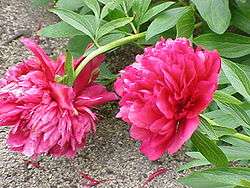peony
English
Etymology
Old English peonie, peonia et al., from Latin paeōnia; later reinforced by Anglo-Norman peonie, Old French peone, from Latin paeōnia, from Hellenistic Ancient Greek παιωνία (paiōnía), from Ancient Greek Παιών (Paiṓn, “Paean, the physician of the gods”)/παιών (paiṓn, “a physician”).
Pronunciation
- IPA(key): /ˈpiːəni/
Audio (US) (file)
Noun
peony (plural peonies)
- A flowering plant of the genus Paeonia with large fragrant flowers. [from 10th c.]
- 1653, Nicholas Culpeper, The English Physician Enlarged, Folio Society 2007, p. 219:
- The root of the Male Peony fresh gathered has been found by experience to cure the falling-sickness.
- 1913, Joseph C. Lincoln, chapter 1, in Mr. Pratt's Patients:
- 'Twas early June, the new grass was flourishing everywheres, the posies in the yard—peonies and such—in full bloom, the sun was shining, and the water of the bay was blue, with light green streaks where the shoal showed.
- 1653, Nicholas Culpeper, The English Physician Enlarged, Folio Society 2007, p. 219:
Translations
Paeonia genus of flowering plants
|
|
This article is issued from
Wiktionary.
The text is licensed under Creative
Commons - Attribution - Sharealike.
Additional terms may apply for the media files.
